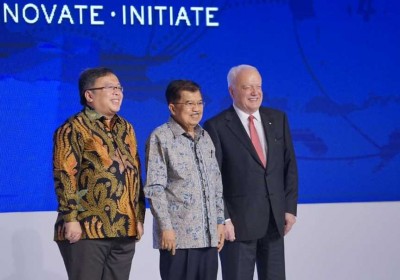Addressing Regional Disparity Essential for Preventing Conflicts: VP
July 15, 2018
National Development Planning Minister Bambang Brodjonegoro, Vice President Jusuf Kalla and Australia's ambassador to Indonesia Gary Quinlan pose for a group photo at the 2018 Indonesia Development Forum (IDF) in Jakarta on Tuesday (10/07). (Photo courtesy of Edelman Indonesia)
Jakarta. Regional leaders must learn from one another how to address disparity for a more holistic approach to deal with economic inequality in Indonesia, Vice President Jusuf Kalla said on Tuesday (10/07).
When Indonesia began its democratic reforms in 1998, one of the key outcomes was decentralization and regional autonomy, which were intended as a means for leaders to address issues specific to their provinces.
"Each province has its own unique qualities, and that must be included in our national growth … It is important for us to learn from each region's experiences," Kalla said at the 2018 Indonesia Development Forum (IDF) in Jakarta.
The vice president said regional autonomy was initially meant to provide room for regional economies to compete more efficiently, attract more investment and contribute to growth at the national level.
The IDF serves as a platform for participants to exchange ideas on how this could be achieved, he added.
Addressing regional disparity, Kalla said, is important for preventing social and political conflicts in the country, which can stem from economic inequality.
National Development Planning Minister Bambang Brodjonegoro told reporters the appointment of new regional leaders in last month's elections gives a momentum to the government's efforts in addressing the problem, as they are expected to produce mid-term regional development plans (RPJMD) soon.
In the past two decades, economic growth has largely been concentrated in western Indonesia — Java and Sumatra — which contributes around 80 percent of the country gross domestic product.
The government aims to develop what Bambang referred to as "new growth centers" in other regions. The process needs to include developing infrastructure, connectivity and metropolitan areas outside of Java.
"Other parts of the country must be able to contribute to Indonesia's growth, so that in the future the focus would not be solely on Java," he said.
This year's IDF was organized by the National Development Planning Agency (Bappenas) in partnership with the Australian government's Knowledge Sector Initiative (KSI). Established in 2017, the forum invites government officials, researchers and civil society organizations.
Source: Jakartaglobe
Indonesia’s Research Institutions Supporting the Development of the Electric Vehicle Industry
Indonesian Muslim Fashion and Cosmetics IKMs Shine at Dubai World Expo 2020
Govt Steps Up UMKM Transformation Efforts in the Midst of Pandemic Slowdown
Govt Encourages Promotion of IKM Products in Digital Era
Government Begins Developing Maritime Training Center in Makassar
Tweets by IDDevForum
